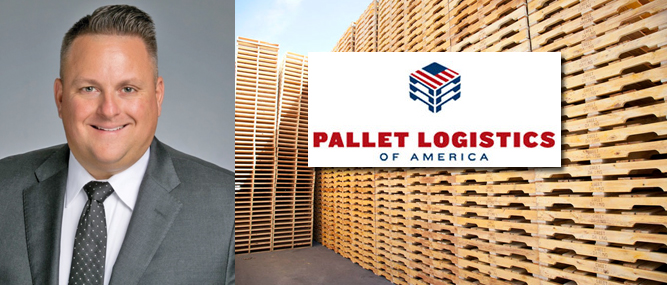Kyle Otting is the CEO of Pallet Logistics of America (PLA). PLA, with headquarters in Dallas, is one of the largest pallet suppliers in the Southwest. It has acquired Pal-Serv, a pallet recycling company also based in Dallas but with operations extending to the East.
Pallet Enterprise: What is the key to succeeding in the pallet recycling sector in the future?
Otting: Flexibility and agility. Post-COVID, the way we do business and how consumers access goods and services has fundamentally changed. Manufacturers and retailers are being forced to adapt to meet these needs, which inevitably causes changes in how pallets are being handled throughout the supply chain. As such, those within the industry that can flex their operations, move at their customers’ pace, and adapt as our customers enhance their supply chain will have an advantage. Things like automation, technology and access to data ultimately will enable the industry to continue to thrive.
Pallet Enterprise: How are customer expectations for pallets changing?
Otting: I believe that coming out of the global pandemic and the disruption within the supply chain, customers are much more focused on service levels and ensuring that they are working with strong operators that can meet their needs. It’s clear that many manufacturers, shippers, growers, 3PLs and retailers have all had some level of service failure or supply disruption. They are actively addressing these shortfalls. Those that can adapt and move quickly with their customers will ultimately be well positioned.
I also believe that access to data and real time insights into the metrics of the overall pallet program is now also on the top of minds of customers. We see customers wanting to truly understand the cost structure of their programs and where there are value drivers.
Pallet Enterprise: What has been a key lesson for your business coming out of the COVID pandemic?
Otting: If nothing else, it has taught us to expect the unexpected. Within the PLA family of companies, I think we’ve done a great job of putting contingency plans in place in the event of disruptions within our vendors as well as managing through the various local, state and federal COVID-19 mandates. We’ve been flexible with our employees in working through more contemporary work schedules and compensation plans all while providing them resources to ensure we are an employer of choice.
Pallet Enterprise: What is PLA looking for in a M&A partner? Any specific areas of focus where the company is looking to grow in terms of expertise or geographic coverage?
Otting: As far as what we are looking for in a partner, it must be a good fit culturally for both organizations. The people aspect of any transaction is by far the most important piece and ensuring both sides are aligned on how to operate and how to best serve our customers is critical. We like markets that have a high growth potential and partnering with owners and founders that can bring as much value to the PLA family as we can bring to their organization. If you look at the acquisitions we have done thus far (from Valley Pallet, Yancey Pallet, PRS, to now Pal-Serv), everyone has benefited by being a part of the collective family.
Pallet Enterprise: PLA has been a little quieter than the other two big players. Do you think the frantic pace of acquisition will continue or slow down in 2022?
Otting: I can’t speak to the strategy or motivations of others in the industry. All I can say is that we are calculated in our approach and put a lot of energy and effort into what happens post-acquisition to ensure a successful outcome for all parties. It’s not quantity, but quality for us, and I feel as if we have had a very successful track record thus far.





